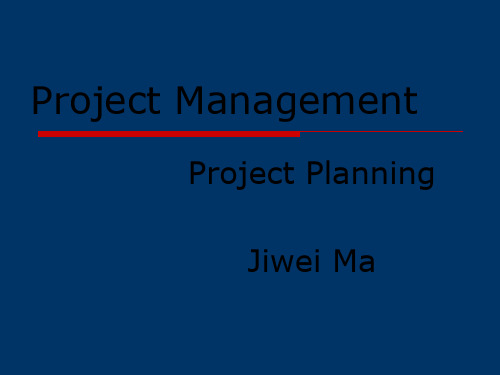工程项目管理-英文课件-ProjectControlling.ppt
- 格式:ppt
- 大小:175.00 KB
- 文档页数:30




As an engineer who has had the privilege of working on several projects over the years, I have gained invaluable insights into the complexities and intricacies of project management. The journey through variousstages of project execution has not only honed my technical skills but also equipped me with a deeper understanding of the human elements that drive successful project outcomes. Below, I share some reflections on my experiences in engineering project management.One of the most crucial aspects of project management is effective communication. In the dynamic environment of engineering projects, where multiple stakeholders are involved, clear and concise communication is essential. It is imperative to establish a communication plan that outlines how information will be shared, the frequency of updates, and the channels through which communication will occur. This ensures thatall team members, from engineers to clients, are on the same page andcan make informed decisions.Another key element is the management of resources. Engineering projects often require a diverse set of resources, including personnel, materials, and equipment. Proper resource allocation is critical to maintaining project timelines and budgets. This involves careful planning, regular monitoring, and the ability to adapt when unforeseen challenges arise. For instance, if a particular component is delayed, it may be necessary to reevaluate the project schedule and reallocate resources accordingly.Risk management is an integral part of project management. Identifying potential risks early on and developing mitigation strategies is crucial for preventing costly delays and ensuring project success. This requires a thorough understanding of the project's scope, a proactive approach to problem-solving, and the ability to anticipate future challenges. By creating a risk register and regularly reviewing it, project managerscan stay ahead of potential issues and minimize their impact.Team leadership is another area that demands attention. A project manager must be adept at fostering a collaborative environment where team members feel valued and motivated. This involves setting clear expectations, providing support and guidance, and recognizing the achievements of the team. Moreover, the ability to resolve conflicts andmaintain a positive work culture is vital for maintaining high morale and productivity.The importance of project documentation cannot be overstated. Comprehensive documentation ensures that all aspects of the project are well-documented, from initial planning to final delivery. This not only serves as a reference for future projects but also helps in maintaining accountability and transparency. Good documentation practices include regular updates, version control, and easy accessibility to all relevant stakeholders.In conclusion, engineering project management is a multifaceted discipline that requires a blend of technical expertise, strategic planning, and interpersonal skills. Through my experiences, I have learned that successful project management is about balancing the technical challenges with the human elements. It is about creating a framework that enables teams to work efficiently, adapt to changes, and deliver high-quality results. As I continue to grow in my career, I look forward to applying these insights and refining my approach to ensure the success of future engineering projects.。

